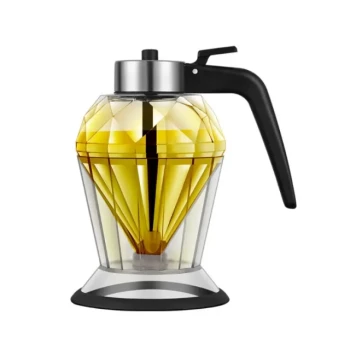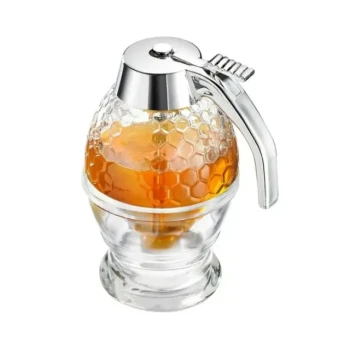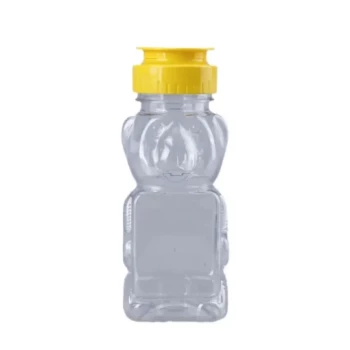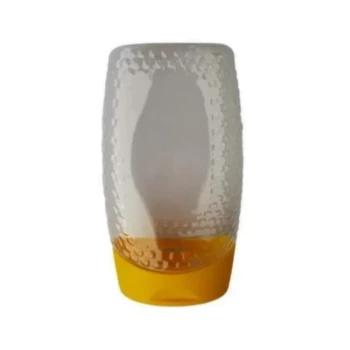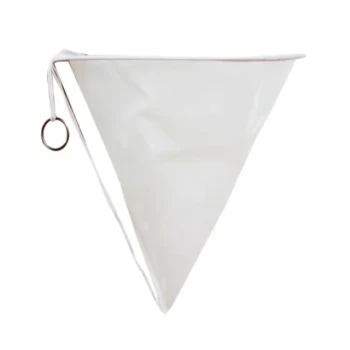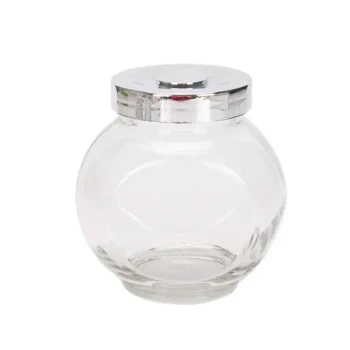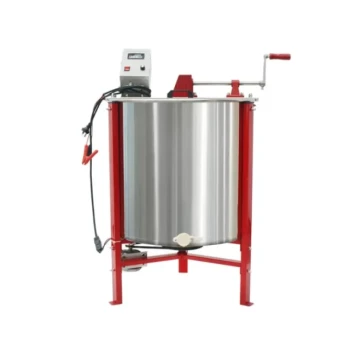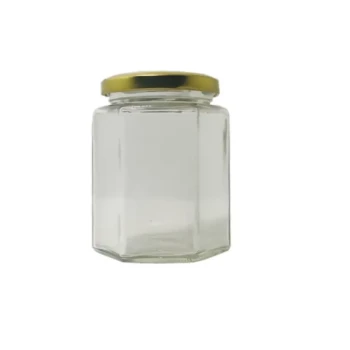Beyond the classic jar of raw honey, a range of value-added products can transform a simple harvest into a diverse and profitable business. By infusing honey with new flavors, changing its texture, or utilizing by-products like beeswax, you can create premium goods that command higher prices and appeal to a wider audience. The most common categories include flavored honeys, creamed honey spreads, beeswax products like candles, and natural beauty items.
The core strategy is to move beyond selling honey as a simple commodity. By thoughtfully creating value-added products, you can significantly increase profit margins, build a stronger brand, and create new revenue streams from the same initial harvest.
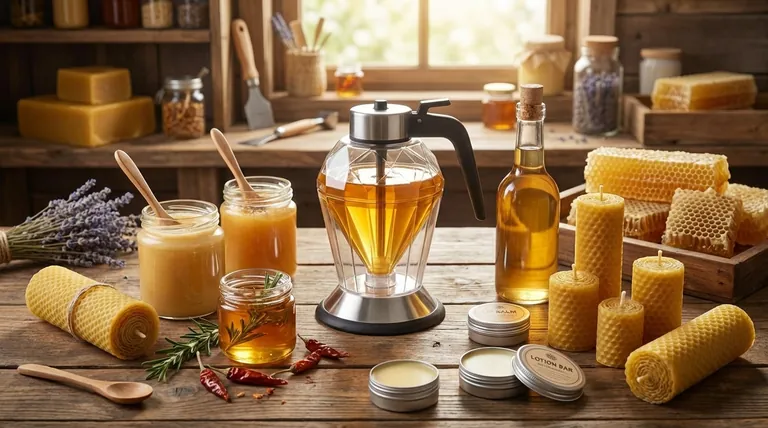
Exploring the Primary Categories of Value-Added Products
Creating value-added products is about understanding and meeting specific consumer desires—whether for unique culinary flavors, convenient textures, or natural, non-food items. Each category serves a different purpose and appeals to a different market segment.
Culinary Innovations: Infusions and Spreads
Flavored or infused honeys are an excellent entry point. By incorporating ingredients like herbs, spices, or fruits, you create a unique product that stands out on the shelf. Think of spicy chili-infused honey for drizzling on pizza or lavender-infused honey for tea.
Creamed honey, also known as whipped or spun honey, is another popular culinary product. This process involves controlling crystallization to create a smooth, thick, and spreadable texture. It solves the common consumer problem of sticky, dripping liquid honey, making it ideal for toast and sandwiches.
Harnessing Beeswax: Candles and Wraps
Beeswax is a natural by-product of honey extraction that holds significant value. Beeswax candles are a classic high-margin item, prized for their natural, subtle scent, long burn time, and the warm, clean light they produce.
A more modern application is the creation of beeswax food wraps. These reusable and sustainable alternatives to plastic wrap appeal strongly to environmentally conscious consumers and fit perfectly with the natural ethos of beekeeping.
Health and Beauty Applications
Honey and beeswax are highly sought-after ingredients in the natural cosmetics industry due to their moisturizing and antibacterial properties. This opens the door to creating a line of personal care products.
Common examples include lip balms, handmade soaps, and solid lotions or salves. These products allow you to market the wholesome, natural benefits of the hive in a completely new way, often commanding premium prices.
Advanced Products: Mead and Honey-Based Beverages
For those willing to navigate a more complex process, producing mead (honey wine) offers one of the highest potential returns. As one of the world's oldest alcoholic beverages, mead has a rich history and a growing craft market. It transforms honey into a sophisticated, high-value beverage.
Understanding the Trade-offs and Considerations
While creating value-added products is profitable, it requires more than just raw ingredients. A clear understanding of the new demands is essential for success.
Investment in Equipment and Skills
Each new product line requires specific tools and knowledge. Making creamed honey requires a specialized mixer or tank, candle making needs molds and melting equipment, and producing mead requires a significant investment in fermentation and bottling gear.
Production Time and Consistency
Value-added products take more time to create than simply bottling raw honey. Infusing flavors, rendering beeswax, or fermenting mead are all processes that add labor and time to your production cycle, which must be factored into your pricing.
Regulatory and Labeling Requirements
Selling a simple jar of honey has straightforward regulations. However, selling cosmetics or alcoholic beverages involves much stricter rules regarding ingredients, facility standards, and labeling. You must research and comply with all local and federal laws for these product types.
Making the Right Choice for Your Business
Your choice of product should align with your resources, skills, and business goals. There is no single "best" option; the right path depends on your strategic focus.
- If your primary focus is a low-cost entry: Start with infused or flavored honeys, as they require the least specialized equipment and build on your core product.
- If your primary focus is maximizing by-products: Concentrate on beeswax candles and food wraps to ensure no part of the harvest goes to waste.
- If your primary focus is convenience and broad appeal: Develop a line of creamed honey spreads to solve a common consumer pain point.
- If your primary focus is building a premium brand: Consider creating a line of natural cosmetics or investing in the complex but highly rewarding process of making mead.
By strategically expanding your offerings, you can elevate your business from a simple honey producer to a diversified and resilient artisan brand.
Summary Table:
| Product Category | Key Examples | Primary Market Appeal |
|---|---|---|
| Culinary Innovations | Infused Honey, Creamed Honey | Unique flavors, convenience |
| Beeswax Products | Candles, Food Wraps | Eco-friendly, natural home goods |
| Health & Beauty | Lip Balms, Soaps, Salves | Natural skincare, premium ingredients |
| Beverages | Mead (Honey Wine) | Craft alcohol, high-value product |
Ready to scale your apiary's product line? HONESTBEE supplies commercial apiaries and beekeeping equipment distributors with the wholesale-focused supplies and equipment needed to efficiently produce high-margin, value-added honey products. From honey processing tanks to beeswax rendering equipment, we provide the tools for success. Contact our experts today to discuss your specific needs and boost your profitability!
Visual Guide
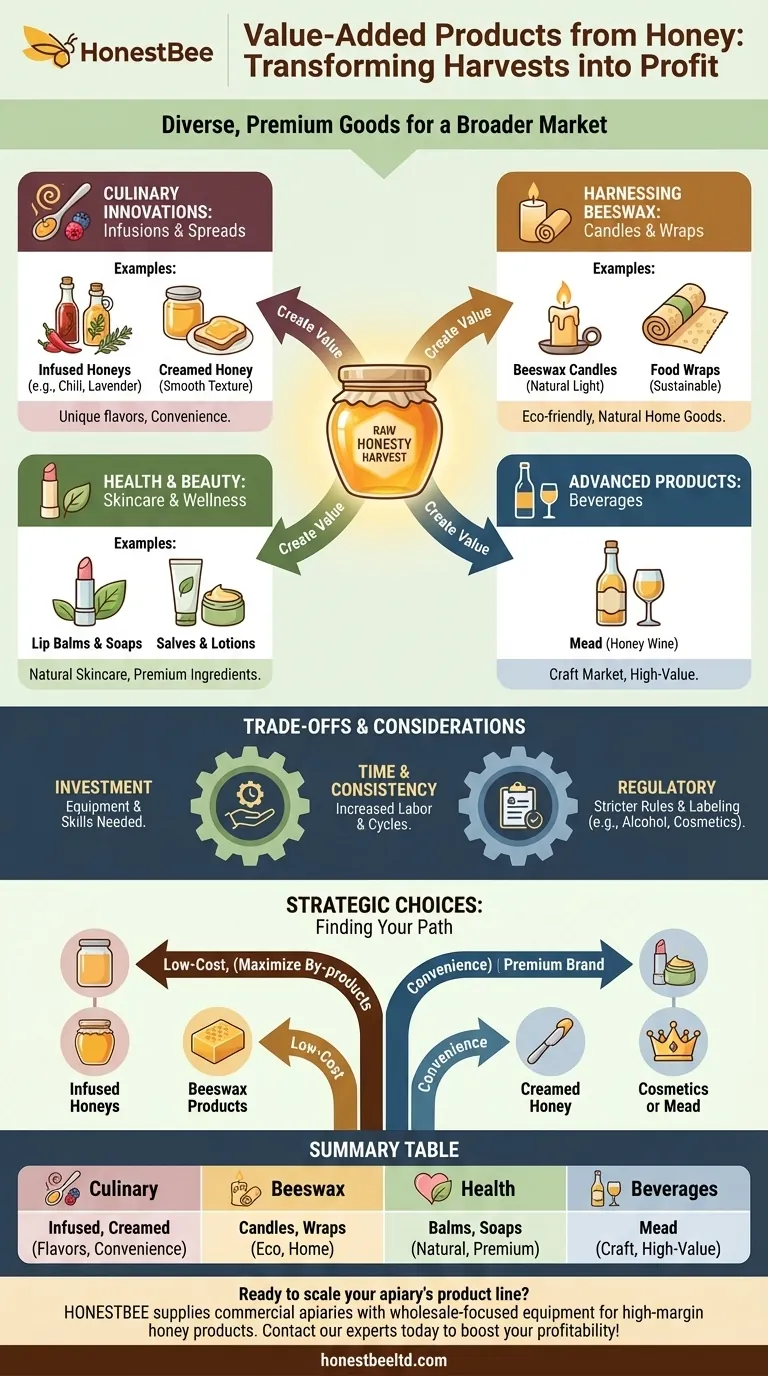
Related Products
- Premium Diamond-Faceted Glass Honey Dispenser
- Food Grade Plastic Honey Bucket Pail for Beekeeping
- Honeycomb Style Drip Free Honey Dispenser
- Stainless Steel Honey Press Wax Press with Tank
- Classic Honey Bear Jars with Flip Top Dispensing Cap for Liquid Sweeteners
People Also Ask
- Why use a honey drizzler? Achieve Perfect, Mess-Free Drizzling Every Time
- Can we store honey in a stainless steel container? Yes, with the right food-grade choice.
- What is the purpose of a honey bowl and dipper setup? Achieve Mess-Free, Elegant Honey Dispensing
- What are four different applications for a honey dipper? Master the Art of Precision Drizzling
- What are the characteristics of squeeze bottles for honey packaging? Optimize Your Product for Convenience
